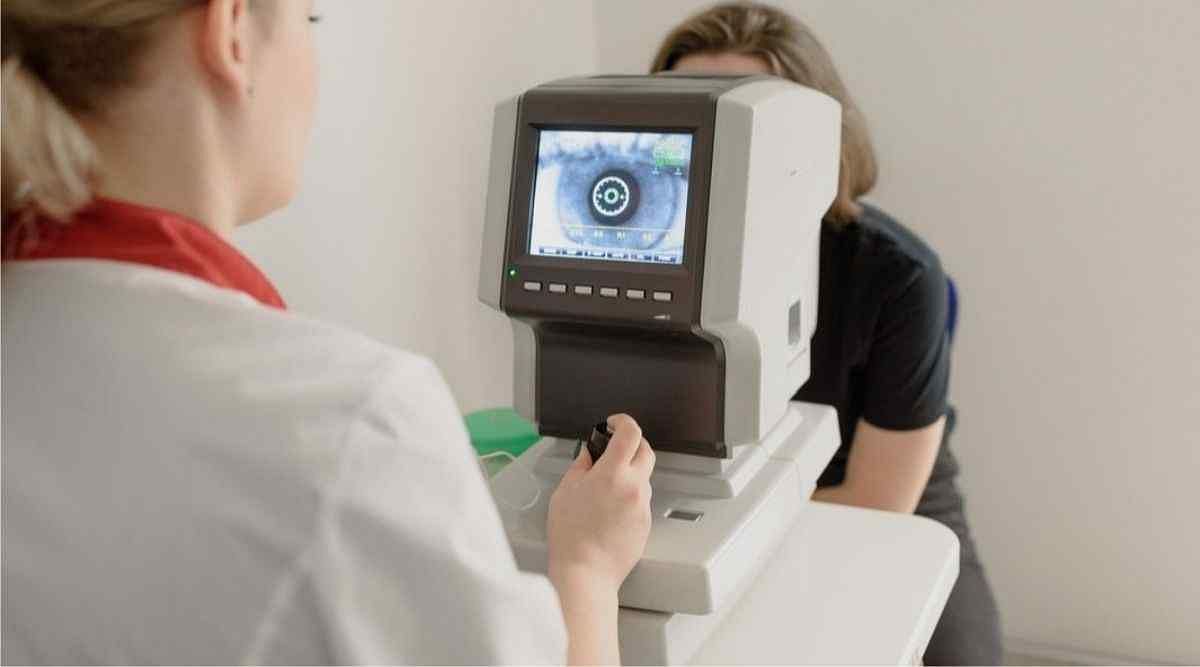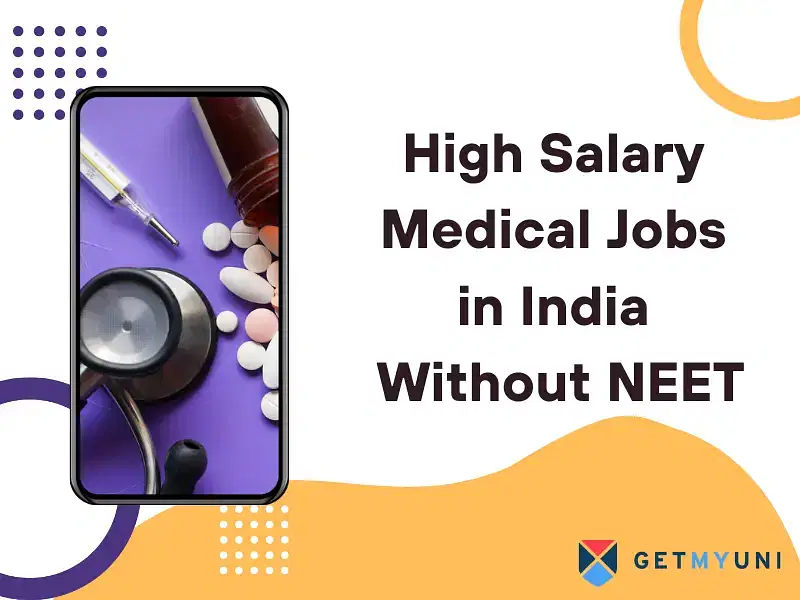B.Sc in Ophthalmic Techniques, Diploma in Ophthalmic Technology, Diploma in Ophthalmology, etc., are some of the best ophthalmology courses after 12th 2023. An ophthalmologist is a medical doctor whose field of speciality is vision and eye care.
Table of Contents
The list of ophthalmology courses after 12th 2023 includes B.Sc in Ophthalmic Techniques, Diploma in Ophthalmic Technology, Diploma in Ophthalmology, Bachelor of Optometry, and many others. In general, ophthalmologists diagnose the eye using a retinal camera, infer the problems, perform surgeries, and treat minor eye defects by prescribing eyeglasses and contact lenses.
Ophthalmology is an unexplored field of study, and plenty of scopes are available for course graduates. It is one of the popular fields of medical study and has gained massive attention over the years. To pursue a career in this field, there are plenty of ophthalmologist courses after 12th 2023 in India established to cater to the demand for aspiring ophthalmologists.
Also Read: Complete guide on Courses after 12th
List of Ophthalmology Courses After 12th 2023
Just like any other medical-related course, ophthalmology courses also require students to be from a science background. Ophthalmology can be pursued as an undergraduate degree or P.G. degree under various streams like science and medicine. Let's take a look at some of the top ophthalmology courses after 12th 2023.
- MBBS
- Bachelor of Optometry (B.Optom)
- B.Sc in Ophthalmic Techniques
- Diploma in Ophthalmic Technology
- Diploma in Ophthalmology
MBBS
One of the top ophthalmology courses after 12th 2023, the MBBS program has a duration of 5.5 years and can be pursued by students who want to become doctors. A valid NEET UG exam score is a must for gaining entry into this program. In order to practice ophthalmology, candidates should first pursue an MBBS course and then a PG degree in ophthalmology, like an MS or an MD.
Candidates must have obtained at least 50% marks in 10+2 with subjects like Physics, Chemistry, and Biology in order to pursue MBBS. The top institutes offering this course in India include AIIMS Delhi, NIMHANS Bangalore, PGIMER Chandigarh, and many others.
Read More: MBBS
Bachelor of Optometry (B.Optom)
Next on the list of the best ophthalmology courses after 12th 2023 is Bachelor of Optometry (B.Optom). This course provides in-depth theoretical and practical scientific knowledge to students who are willing to become optometrists. Earlier, the role of optometrists was limited to fitting spectacles but in recent times they can also examine and assist in diagnosing various eye conditions.
The duration of this course is 3 years along with 1 year internship at an eye hospital. At least 50% marks with PCB subjects in class 12th is mandatory for candidates looking to pursue to this course. Some of the top institutes that offer this course are GMCH Chandigarh, MAHE Manipal, SRM Chennai, etc.
Read More: Bachelor of Optometry (B.Optom)
B.Sc in Ophthalmic Techniques
It is one of the best ophthalmology courses after 12th 2023. An undergraduate course in Ophthalmology, B.Sc Ophthalmic Techniques, focuses on diagnosing and treating disorders and diseases using modern equipment. Students gain practical knowledge from performing diagnostics and handling ophthalmic equipment. Here are some points related to the course:
- The duration of the course B.Sc Ophthalmic techniques is three years and varies from time to time by individual institutes.
- The coursework is structured in increasing order of difficulty and majorly deals with theoretical aspects of ophthalmology.
- Students will get sufficient knowledge of various diseases and disorders and the proper techniques to diagnose them upon completing the course.
- The coursework also enhances their understanding of advanced ophthalmic technologies.
- The course offers enormous scope for further research work in the field of ophthalmology and vision-based technology.
- The course fees for B.Sc Ophthalmic Techniques range from INR 1.35 to 2 LPA.
Diploma in Ophthalmology
A diploma in ophthalmology after the 12th is a great option for students to consider. This is because ophthalmology is a field of study which describes medical lessons like anatomy, physiology, and ophthalmic sickness. The course duration is about one year which comprises two semesters, and the term may vary with the rules and regulations of different institutes.
After completing ophthalmology courses, students get employment offers in various state and central governed hospitals and even expand a scope to work with organizations like the Indian Council Of Medical Research (ICMR). With an acquired experience of 4-5 years, they could also start up their private eye clinic.
Diploma in Ophthalmic Technology
Another among the ophthalmology courses after 12th 2023 is a diploma in ophthalmic technology. It is commonly known as DOT and is a diploma certificate program. The key focus of the course is to train the students on topics such as eye examination, vision defects, ocular diseases, optics, surgery, and so on. The course duration is about three years, and for 10+2 students, it is for two years.
The coursework majorly deals with eye diagnosis and the technology behind the diagnosis machines used. With training in examining patients, treating eye problems, and testing ophthalmic equipment, graduates who completed their DOT are the highest-paid technicians who train and work under Ophthalmologists. The course fee for a diploma in ophthalmic technology is about 2- 4LPA depending on the institute that offers the course.
Top Ophthalmology Institutes in India
Being an essential course with a booming scope, here are some of the best institutions to start a career in ophthalmology :
- AIIMS New Delhi
- CMC Vellore
- GMC Goa
- JIPMER Pondicherry
- Maulana Azad Medical College
- Regional Institute Of Ophthalmology Ahmedabad
- Regional Institute Of Ophthalmology Chennai
- Regional Institute Of Ophthalmology Kolkata
- TN Nair Medical College (TNMC), Mumbai
- Advanced Eye Centre- Post Graduate Institute of Medical Education Research (PGIMER), Chandigarh
Eligibility Criteria for Ophthalmology Courses After 12th 2023
Ophthalmology courses are pursued at different levels, and each set of courses has its requirements and eligibility criteria. The requirements vary from one college to another, but the standard criteria set by the Medical Council Of India (MCI) for these courses are as follows:
For Bachelor's degree in Ophthalmology :
- Students must clear 10+2 examinations in the science group with a minimum aggregate score of 50%. Biology should be a mandatory subject of study.
- Students are required to clear NEET examinations for a medical degree in ophthalmology, but they are required to clear any university-level entrance examination for a sciences degree.
For Diploma courses:
- Students are required to clear their 10+2 examination with a minimum aggregate of 50% in the science group. Biology is a mandatory subject of study.
- There are no such concrete entrance examinations for diploma courses. However, some private universities conduct entrance exams of their own.
For the Master's degree in Ophthalmology :
- The applicant should have completed their bachelor’s degree from a university or college recognized by the Medical Council Of India (MCI) with a minimum aggregate score of 50%.
- Should clear NEET PG or other university-level examinations with an excellent aggregate score.
Entrance Examinations for Admission
Admissions for ophthalmology degree courses are made using NEET examinations in general. However, for master’s studies, except NEET PG, several other entrance exams are conducted at the university level. Some of the entrance exams are as follows :
- Aligarh Muslim University Entrance Exam
- All India School of Open Schooling Entrance Exam
- Akash Institute of Medical Sciences & Research Centre Entrance Exam
- Baba Farid University of Health Sciences Entrance Exam
- Bangalore University Entrance Exam
- Barkatullah University Entrance Exam
- Basic Life Support in Obstetrics Entrance Exam
- Bharathiar University Entrance Exam
- Bharati Vidyapeeth Common Common Entrance Test
- University of Andhra Entrance Exam
- University of Calicut Entrance Exam
- University of Lucknow Entrance Exam
- University of Rajasthan Entrance Exam
- West Bengal University of Health Sciences
Career Scope in Ophthalmology
In considering the rising human population, demand and job security will always be there for future ophthalmologists. Ophthalmologists are highly in demand with both Asian and European countries under both government and private sectors under clinics, hospitals, missionaries, NGOs, and various fields of medicine.
After training for about three to four years, ophthalmologists can set up their private clinics and be profitable. They can even share their knowledge by teaching as professors and giving seminars related to ophthalmology in various college institutions.
- Clinical Assistant
- Medical assistant
- Ophthalmic Technician
- Ophthalmologists
- Ophthalmology Surgeon
- Professor / Lecturer
Ophthalmology Salary
Some of the top job designations and average pay for ophthalmologists are listed in the table below:
| Designation | Average Salary |
| Optician | INR 4 LPA |
| Optometrist | INR 7.66 LPA |
| Ophthalmic Technician | INR 5 LPA |
| Ophthalmologist | INR 10 LPA |
| Senior Optometrist | INR 8 LPA |
| Surgeon | INR 9 LPA |
The average salary for an ophthalmology graduate depends on several factors like specialization area, the sector they're working in, and job designation. Freshers' salaries may be comparatively lesser than other streams, but as their experience increases, the pay scale is multifold. Even within the field, the salaries vary as private hospitals tend to pay more than government clinics and vice versa.























POST YOUR COMMENT